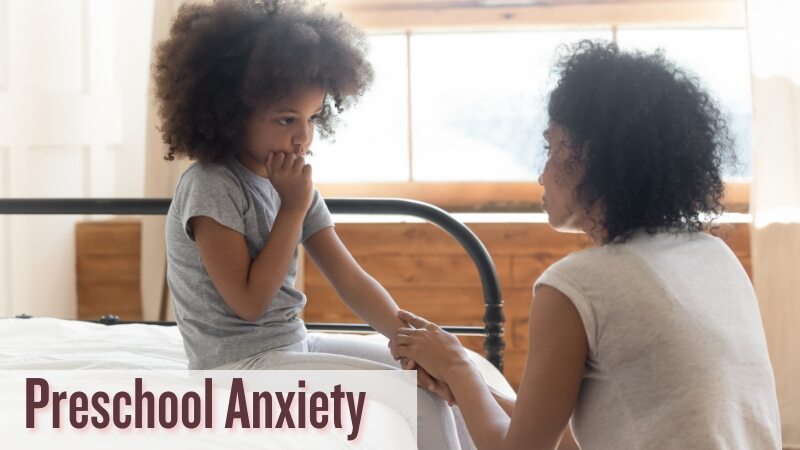
Preparing your child for the first day of preschool may seem like a herculean task for both parents and toddlers. Whereas a tiny tot is apprehensive about the new environment, parents generally wonder whether their little one is ready for it. Preschool separation anxiety is common; however, for a parent, the tearful goodbye of their little one is emotionally draining.
As a parent, you can also ease the process with some helpful tips to make the transition smoother. Establish a consistent goodbye routine and move away from the place. Eventually, those tears would turn into smiles in a couple of days.
What is Preschool Separation Anxiety?

Preschool separation anxiety is a condition of intense emotional distress that most toddlers experience when they transition to preschool. As toddlers form strong bonds with their parents, especially with their mothers, they fear being separated from them. Separation anxiety is a very common and natural phenomenon in toddlers. It starts when toddlers are around 6–12 months old and they start feeling that objects and people exist even when they are out of sight. When a tiny tot feels their mom or dad are not to be seen around, they start panicking. (1)
The little ones do not understand the concept of time, so they do not understand when their parents will be back. As the parent-child relationship is secure and safe, the toddler seems to feel fearful and insecure in others’ presence. (2) Often separation anxiety in preschool is due to stranger anxiety, when the tiny fellow doesn’t know whether to trust new people who are unknown to them Thus, They would do anything to prevent the parents from ‘disappearing’, resulting in clingy, crying fellows who resist attention from everyone else except their parents. (3)
What Causes Preschool Anxiety?

Your tiny tot is unaware of everyone and knows only “you.”. Probably, that’s the reason they cannot trust anyone else, like teachers and support staff in a new preschool environment. Their deep-seated insecurity gives rise to anxiety, clinginess, and temper tantrums. (4)
- Lack of familiarity and security: Kids feel safe with their parents. Being separated creates a fear in their minds, which is difficult to shake off. The place is unfamiliar, the faces are new, the sense of comfort is lost, and the toddler starts feeling left out. (5)
- Estimate of time: Toddlers are not aware of how to estimate the time. Now you might say that a few hours is a few hours indeed, but for a little chap, a few minutes or three hours is the same thing.
- Fear: Toddlers fear that something might happen to them or the ones they love. The uncertainty involved with separation is the cause of the fear. Many tiny tots have the fear that their parents will not return to pick them up and take them back. This can make your toddler extremely clingy. (6)
- Attachment: Bonds between a ward and parents are way too strong during the initial stages of life. Your little one depends on you for everything; they cannot imagine their life without you even for a few seconds.
- Attention: In an unfamiliar surrounding, the kids may not get the same attention as they are used to getting at home. The shift from one caregiver devoted to them to a caregiver looking after many other toddlers is difficult to digest. They tend to feel isolated and alone.
Preschool Separation Issues

Parents are at the receiving end of preschool anxiety. The level of anxiety may vary from one toddler to another but some common preschool anxiety issues persist everywhere.
- Not letting go: The toddler refusing to let go of the parent is natural due to the strong relationship. They can become very stubborn in some cases, causing a lot of chaos.
- Refusing to go to school: Very often the tiny fellow refuses to go to school, as they don’t like it there. They insist on not attending school by citing various issues faced by them.
- Complaints about feeling sick: To avoid school, the toddler might even complain about having a stomachache or a headache.
Strategies To Deal With Pre-school Separation Anxiety

If dealt with carefully, this problem can be easily resolved. There are a few preschool separation anxiety strategies that parents must follow to ensure an easy drop-off.
- Creating goodbye routines: Creating a good-bye routine with your toddler will help. The best is a short and crisp bye, accompanied by a reassuring kiss. The sooner the kid starts understanding that a goodbye is followed by the parent going away for some time, the more it will help them. Avoid sneaking out on them. (7)
- Get them acquainted with unfamiliar surroundings: To avoid the panic that the ward might face on the first day of preschool, getting them acquainted with their new preschool can help. This will help them to adapt to the new surroundings much more quickly.
- Help them fight the fear by motivating them: Remind them of all the times that they were scared to try out things and how they managed to overcome their fear. Assure them that preschool will be fun and interesting
- Let them carry a transitional object: A favorite toy, a car, or any other toy can help them form some kind of association when they feel left out. Let the kid carry their favorite object from home to feel at ease.
- Introduce the kid to the school and teachers beforehand: This technique will prevent them from feeling abandoned. If the toddler knows the teachers or has seen the school, they will find it easier to adjust. Once you introduce your tiny tot to the teacher, step back and let them strike an independent rapport with the teacher.
- Involve him in preschool shopping preparations: Buying a bag that has their favorite cartoon character on it, a water bottle they like, and such small things will help the toddler adjust to the idea. Talking to them about the school and the activities will create excitement in them. The toddler must look forward to attending school
- Do not make false promises: It is essential for parents to not lie to their wards. Promising that they will be back soon or will be waiting for them (when they don’t plan to stay) will make the toddler more restless. Be honest and tell them that you will be gone and be back only after a few hours
All said and done, the parent needs to be strong. Having a weak moment will be like feeding your toddler’s anxiety with a lot of insecurity. Being brave will help you and the toddler to succeed through this ordeal and fight the separation anxiety together.
FAQ’s
1. How Long Does Preschool Separation Anxiety Last?
Preschool separation anxiety typically lasts a few weeks to a couple of months. Toddlers will slowly and gradually adjust, with most feeling more comfortable after consistent routines at home and school, followed by reassurance from caregivers and endless support from teachers at school.
2. Will My Child Grow Out of Separation Anxiety?
Yes, most children grow out of separation anxiety as they mature, start developing coping skills, and become more secure in their environment. It often improves with time and positive experiences at school.
3. How Do Teachers Deal With Separation Anxiety?
Teachers deal with separation anxiety by creating a warm, welcoming environment where the tiny tot feels secure and happy. Moreover, establishing routines as per their needs, and offering comfort when they cry greatly helps The teacher may encourage gradual separation and communicate with parents to ease transitions.
References
- Joshua Feriante; Tyler J. Torrico; Bettina Bernstein. University of Massachusetts Medical School, Consilient Interventional Psychiatry, Phil College of Osteo Med, Hosp of Phil – https://www.ncbi.nlm.nih.gov/books/NBK560793/
- Jreisat S. Separation Anxiety among Kindergarten Children and its Association with Parental Socialization. Health Psychol Res. 2023 Jun 16;11:75363 – https://www.ncbi.nlm.nih.gov/pmc/articles/PMC10292687/#
- A. Scher, J. Harel, in Encyclopedia of Infant and Early Childhood Development, 2008 – https://www.sciencedirect.com/topics/psychology/stranger-anxiety
- Katie Hurley, LCSW, child and adolescent psychotherapist and parenting expert, Helping Preschoolers Cope with Separation Anxiety – https://www.pbs.org/parents/thrive/helping-preschoolers-cope-with-separation-anxiety#
- Guantia, G.B. (2023). The Lived Experiences of Teachers and Parents on Kindergarten Learners’ Separation Anxiety. Industry and Academic Research Review, 4 (1), 493-503. – https://iiari.org/conference_article/the-lived-experiences-of-teachers-and-parents-on-kindergarten-learners-separation-anxiety/#
- UNICEF Parenting, How to manage your child’s separation anxiety? – https://www.unicef.org/parenting/child-care/managing-child-separation-anxiety#
- Colleen Johnson, MD, Pediatrician, Midtown Clinic – Hard Goodbyes: Easing separation anxiety in kids – https://childrenswi.org/newshub/stories/easing-separation-anxiety#
